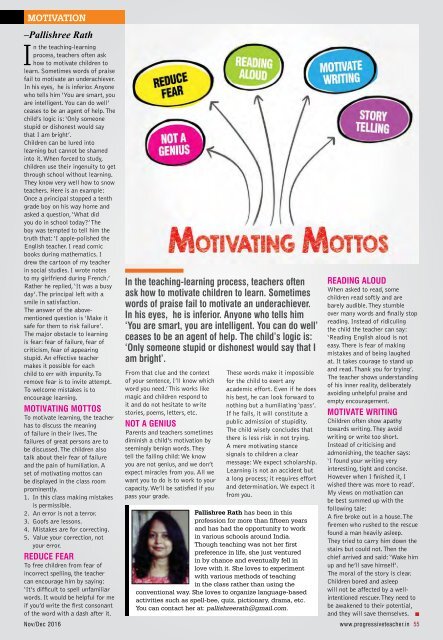The Progressive Teacher Vol 03 Issue 05
This issue of The Progressive Teacher focuses on "Teaching of Social Studies". The magazine provides guidance to the teachers by their peers and school leaders for tackling challenges with innovative ideas.
This issue of The Progressive Teacher focuses on "Teaching of Social Studies". The magazine provides guidance to the teachers by their peers and school leaders for tackling challenges with innovative ideas.
You also want an ePaper? Increase the reach of your titles
YUMPU automatically turns print PDFs into web optimized ePapers that Google loves.
motivation<br />
–Pallishree Rath<br />
In the teaching-learning<br />
process, teachers often ask<br />
how to motivate children to<br />
learn. Sometimes words of praise<br />
fail to motivate an underachiever.<br />
In his eyes, he is inferior. Anyone<br />
who tells him ‘You are smart, you<br />
are intelligent. You can do well’<br />
ceases to be an agent of help. <strong>The</strong><br />
child’s logic is: ‘Only someone<br />
stupid or dishonest would say<br />
that I am bright’.<br />
Children can be lured into<br />
learning but cannot be shamed<br />
into it. When forced to study,<br />
children use their ingenuity to get<br />
through school without learning.<br />
<strong>The</strong>y know very well how to snow<br />
teachers. Here is an example:<br />
Once a principal stopped a tenth<br />
grade boy on his way home and<br />
asked a question, ‘What did<br />
you do in school today?’ <strong>The</strong><br />
boy was tempted to tell him the<br />
truth that: ‘I apple-polished the<br />
English teacher. I read comic<br />
books during mathematics. I<br />
drew the cartoon of my teacher<br />
in social studies. I wrote notes<br />
to my girlfriend during French.’<br />
Rather he replied, ‘It was a busy<br />
day’. <strong>The</strong> principal left with a<br />
smile in satisfaction.<br />
<strong>The</strong> answer of the abovementioned<br />
question is ‘Make it<br />
safe for them to risk failure’.<br />
<strong>The</strong> major obstacle to learning<br />
is fear: fear of failure, fear of<br />
criticism, fear of appearing<br />
stupid. An effective teacher<br />
makes it possible for each<br />
child to err with impunity. To<br />
remove fear is to invite attempt.<br />
To welcome mistakes is to<br />
encourage learning.<br />
MOTIVATING MOTTOS<br />
To motivate learning, the teacher<br />
has to discuss the meaning<br />
of failure in their lives. <strong>The</strong><br />
failures of great persons are to<br />
be discussed. <strong>The</strong> children also<br />
talk about their fear of failure<br />
and the pain of humiliation. A<br />
set of motivating mottos can<br />
be displayed in the class room<br />
prominently.<br />
1. In this class making mistakes<br />
is permissible.<br />
2. An error is not a terror.<br />
3. Goofs are lessons.<br />
4. Mistakes are for correcting.<br />
5. Value your correction, not<br />
your error.<br />
REDUCE FEAR<br />
To free children from fear of<br />
incorrect spelling, the teacher<br />
can encourage him by saying:<br />
‘It’s difficult to spell unfamiliar<br />
words. It would be helpful for me<br />
if you’d write the first consonant<br />
of the word with a dash after it.<br />
Nov/Dec 2016<br />
In the teaching-learning process, teachers often<br />
ask how to motivate children to learn. Sometimes<br />
words of praise fail to motivate an underachiever.<br />
In his eyes, he is inferior. Anyone who tells him<br />
‘You are smart, you are intelligent. You can do well’<br />
ceases to be an agent of help. <strong>The</strong> child’s logic is:<br />
‘Only someone stupid or dishonest would say that I<br />
am bright’.<br />
From that clue and the context<br />
of your sentence, I’ll know which<br />
word you need.’ This works like<br />
magic and children respond to<br />
it and do not hesitate to write<br />
stories, poems, letters, etc.<br />
NOT A GENIUS<br />
Parents and teachers sometimes<br />
diminish a child’s motivation by<br />
seemingly benign words. <strong>The</strong>y<br />
tell the failing child: We know<br />
you are not genius, and we don’t<br />
expect miracles from you. All we<br />
want you to do is to work to your<br />
capacity. We’ll be satisfied if you<br />
pass your grade.<br />
<strong>The</strong>se words make it impossible<br />
for the child to exert any<br />
academic effort. Even if he does<br />
his best, he can look forward to<br />
nothing but a humiliating ‘pass’.<br />
If he fails, it will constitute a<br />
public admission of stupidity.<br />
<strong>The</strong> child wisely concludes that<br />
there is less risk in not trying.<br />
A mere motivating stance<br />
signals to children a clear<br />
message: We expect scholarship.<br />
Learning is not an accident but<br />
a long process; it requires effort<br />
and determination. We expect it<br />
from you.<br />
Pallishree Rath has been in this<br />
profession for more than fifteen years<br />
and has had the opportunity to work<br />
in various schools around India.<br />
Though teaching was not her first<br />
preference in life, she just ventured<br />
in by chance and eventually fell in<br />
love with it. She loves to experiment<br />
with various methods of teaching<br />
in the class rather than using the<br />
conventional way. She loves to organize language-based<br />
activities such as spell-bee, quiz, pictionary, drama, etc.<br />
You can contact her at: pallishreerath@gmail.com.<br />
READING ALOUD<br />
When asked to read, some<br />
children read softly and are<br />
barely audible. <strong>The</strong>y stumble<br />
over many words and finally stop<br />
reading. Instead of ridiculing<br />
the child the teacher can say:<br />
‘Reading English aloud is not<br />
easy. <strong>The</strong>re is fear of making<br />
mistakes and of being laughed<br />
at. It takes courage to stand up<br />
and read. Thank you for trying’.<br />
<strong>The</strong> teacher shows understanding<br />
of his inner reality, deliberately<br />
avoiding unhelpful praise and<br />
empty encouragement.<br />
MOTIVATE WRITING<br />
Children often show apathy<br />
towards writing. <strong>The</strong>y avoid<br />
writing or write too short.<br />
Instead of criticising and<br />
admonishing, the teacher says:<br />
‘I found your writing very<br />
interesting, tight and concise.<br />
However when I finished it, I<br />
wished there was more to read’.<br />
My views on motivation can<br />
be best summed up with the<br />
following tale:<br />
A fire broke out in a house. <strong>The</strong><br />
firemen who rushed to the rescue<br />
found a man heavily asleep.<br />
<strong>The</strong>y tried to carry him down the<br />
stairs but could not. <strong>The</strong>n the<br />
chief arrived and said: ‘Wake him<br />
up and he’ll save himself’.<br />
<strong>The</strong> moral of the story is clear.<br />
Children bored and asleep<br />
will not be affected by a wellintentioned<br />
rescuer. <strong>The</strong>y need to<br />
be awakened to their potential,<br />
and they will save themselves.<br />
www.progressiveteacher.in 55


















